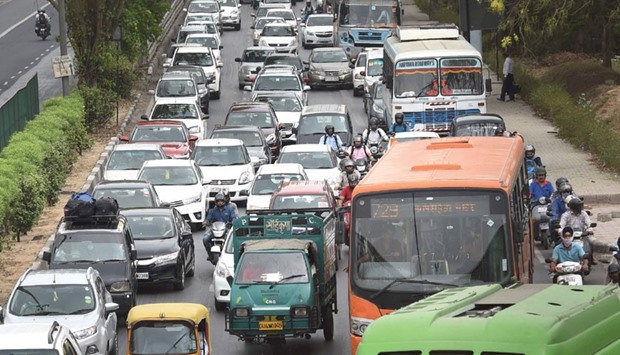
Commuters travel in a traffic jam on their way to Gurgaon from New Delhi yesterday. The national capital witnessed massive jams for a second day as taxi drivers protested against the ban on diesel cabs.
The Delhi government yesterday urged the Supreme Court to relax its order banning cabs operating on diesel, as protesting taxi drivers created a gridlock in large parts of the national capital region for the second day.
A court bench headed by Chief Justice T S Thakur asked the city government to give a roadmap for phasing out diesel cabs and switching over to the cleaner compressed natural gas (CNG) fuel.
The government told the court that it would file a roadmap by evening after which the matter was listed to be heard today.
The Delhi government later sought two days’ time to submit the roadmap. Thus, the consideration of the plea for relaxation of the April 30 ban order is unlikely to take place today.
The court yesterday said its order to ban diesel taxis was not intended to cause any inconvenience to the people but to curb the rising pollution in the capital, considered one of the worst polluted cities in the world.
As the Delhi government said it was “fully committed to tackling pollution” but “a problem has arisen for the citizens,” the bench said: “We also don’t intent to create a human problem but whenever such measures are taken it does lead to some inconvenience.”
The court on April 30 refused extension of time to diesel cab operators for switching over to CNG, saying it had already given several extensions and could not go on extending it.
The court by its December 16, 2015 order had asked diesel cab operators in Delhi to switch over to CNG by March 1 this year.
However, by its January 5, 2016 order, the court brought all diesel cars operating in the NCR under the ambit of its December 16, 2015 order and extended the deadline till March 31.
Meanwhile scores of drivers of diesel taxis blocked three major roads, causing major traffic jams which police said abated after some demonstrators were detained and others dispersed.
Dozens of drivers parked their taxis on the Mahipalpur flyover leading to the Indira Gandhi International Airport, on another key road that links Delhi with Noida in Uttar Pradesh and in a south Delhi area that is linked to Gurgaon in Haryana.
In no time, hundreds of vehicles were caught up on both sides of the roads - like on Monday.
Police reached all three spots and engaged the drivers in discussion from about 9am.
“We tried to reason with them that their protest was causing hardships to the people and this wasn’t fair,” Joint Commissioner of Police Sharad Aggarwal said.
“We told them that if they had issues with any judicial ruling, they must talk to the government.”
Aggarwal said that some of the drivers who accepted the reasoning took away their taxis. Those who refused to were taken to a police station and their taxis were impounded.
“The entire process took 45 minutes to an hour. By then, there were jams everywhere... But now, three hours after it all began, there is no traffic jam anywhere in Delhi due to any taxi protest,” Aggarwal said.
Another police officer, Ishwar Singh, said that three taxis were found illegally parked on the Rajoukri flyover in south Delhi, apparently to create a traffic jam. But they were quickly removed.
Aggarwal said: “We are telling the drivers not to go for such protests because the general public is affected very badly.”
lDelhi Chief Secretary Kewal Kumar Sharma yesterday said there was a problem of multiplicity of authorities in charge of urban transport in the national capital.
“In Delhi, there isn’t a single authority with regard to public transport. There are certain policy issues which need to be addressed. More needs to be done to improve transportation in Delhi. I request DMRC (Delhi Metro Rail Corporation) to play whatever unified role it can in this direction.”
